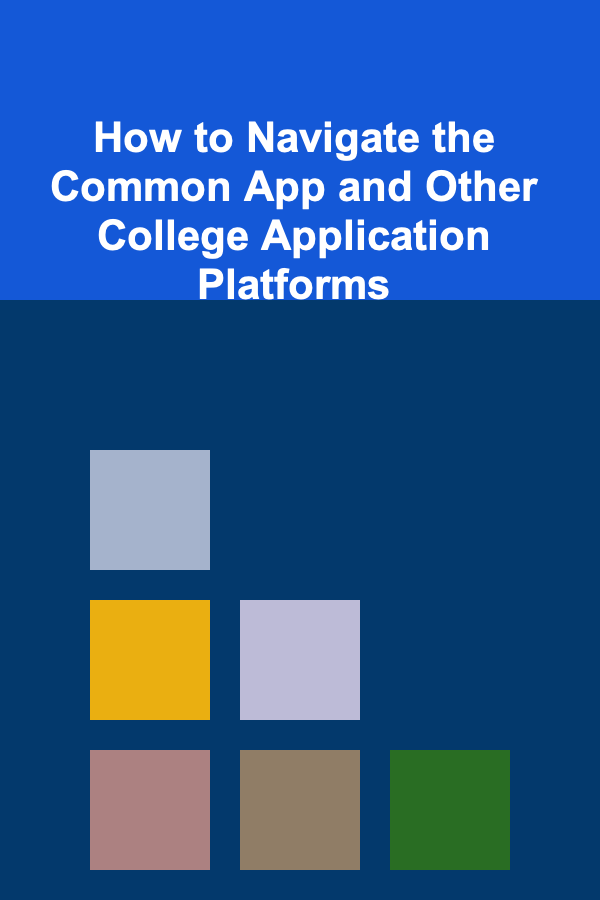
How to Navigate the Common App and Other College Application Platforms
ebook include PDF & Audio bundle (Micro Guide)
$12.99$10.99
Limited Time Offer! Order within the next:

Applying to college can be a daunting process, with multiple steps, deadlines, and a variety of platforms to navigate. One of the most widely used platforms for college applications is the Common App, but many colleges also use other application systems like the Coalition Application, individual university applications, or specialized platforms for art or music schools. Understanding how to navigate these platforms efficiently is crucial for a smooth and successful application experience.
This guide will provide a comprehensive, actionable approach to navigating the Common App and other college application platforms, helping you manage the process with ease and confidence.
Understand the Basics of the Common App
The Common App is a widely accepted college application system that allows you to apply to multiple colleges with one application. It simplifies the process by letting you submit the same core information to all participating schools. Understanding how to fill out the Common App properly is the first step in managing your applications effectively.
Key Components of the Common App:
- Profile Information: This section includes basic information such as your name, contact details, citizenship status, and family background.
- Educational Background: You'll need to provide information about your high school, including your GPA, class rank (if applicable), and courses taken.
- Test Scores: If you've taken standardized tests like the SAT or ACT, you will report your scores here. You can choose to send your test scores to specific colleges or all schools to which you're applying.
- Extracurricular Activities: You can list your involvement in clubs, sports, volunteer work, internships, and other activities. The Common App allows you to detail up to 10 activities.
- Personal Statement: One of the most critical parts of your application. This is your opportunity to showcase who you are beyond grades and test scores. You'll need to write an essay on a topic of your choice, reflecting on personal experiences, challenges, or accomplishments.
Actionable Tip:
- Begin by carefully filling out your profile information, and double-check all entries for accuracy.
- Start early on your personal statement. Consider brainstorming multiple ideas and revising your essay over time. Your personal statement should give insight into your character and academic interests.
Research Each College's Requirements
While the Common App simplifies the application process, it's important to remember that each college may have additional requirements. Some schools may require supplementary essays, letters of recommendation, or specific application materials.
Key Requirements to Watch Out For:
- Supplementary Essays: Many schools ask additional essay questions that are specific to that institution. These can vary in topic and length, so it's important to read each question carefully and tailor your response to that college.
- Letters of Recommendation: Some colleges may ask for one or more letters of recommendation from teachers or mentors. Be sure to give your recommenders plenty of time to write thoughtful letters and provide them with necessary information.
- Interviews: Certain colleges may require or offer optional interviews as part of the application process. Prepare for these by researching the college and practicing common interview questions.
Actionable Tip:
- Keep a checklist of each school's specific requirements. Use a calendar to track deadlines for essays, recommendation letters, and supplementary materials.
- If you're applying to multiple schools, make sure to stay organized by keeping track of which essays or additional materials are needed for each application.
Explore Other College Application Platforms
While the Common App is the most widely used, other platforms may be required by certain colleges. The Coalition Application and Universal College Application are two other popular platforms that allow you to apply to multiple schools at once. In addition, some schools have their own proprietary application systems, which can be specific to that school or type of program (e.g., art, music, or business schools).
The Coalition Application
The Coalition Application is similar to the Common App, but it includes additional tools for organizing your application materials, such as a digital locker where you can store documents, essays, and projects. It's used by many selective schools, particularly in the U.S.
Key Features of the Coalition Application:
- Digital Locker: A place to store important documents like your personal statement drafts, recommendation letters, and other materials for easy access.
- Personal Essay: Similar to the Common App, you will write a personal essay that reflects your character and experiences.
- College List: You can add schools to your list and track your progress with each individual application.
Actionable Tip:
- If you're applying through the Coalition, explore the digital locker and start uploading your materials early to ensure you have everything ready before deadlines.
- Double-check each school's specific instructions on the Coalition platform, as they may have unique requirements or guidelines.
School-Specific Applications
Some colleges may have their own proprietary application systems. These applications often require the same basic information as the Common App but may ask for different essay prompts or additional forms. While it may seem like extra work, filling out school-specific applications often shows the admissions committee that you are particularly interested in their program.
Actionable Tip:
- Stay organized by setting reminders for each individual application's due date and required materials.
- Be sure to check the school's website for specific instructions on submitting supplementary materials or completing unique application steps.
Manage the College Application Timeline
The college application process can be overwhelming, but creating a detailed timeline will help you stay on track. Use a combination of digital and physical tools to keep yourself organized, such as Google Calendar or a planner.
Key Milestones to Include:
- Research Phase: Begin researching colleges early to decide which schools you want to apply to. Note their application deadlines, requirements, and any unique aspects of their application platforms.
- Application Start: Set a target date for when you'll begin completing applications. Make sure to have your test scores, high school transcripts, and any other supporting documents ready.
- Essay Deadlines: Plan enough time to draft and revise your essays. Your personal statement and any supplemental essays should be completed well before the final deadline.
- Recommendations and Interviews: Make sure your recommenders know about your deadlines and any specific guidelines. If you have interviews, schedule them in advance to allow time for preparation.
Actionable Tip:
- Break down the application process into manageable steps. Don't wait until the last minute to start writing your essays or gathering recommendation letters.
- Keep a master spreadsheet that tracks deadlines, school-specific requirements, and the status of your applications.
Stay Organized and Use Tools for Efficiency
Organization is key to successfully navigating multiple application platforms. Consider using digital tools to streamline your process and reduce the chances of missing key deadlines or documents.
Recommended Tools:
- Google Calendar: Set reminders for deadlines, interviews, and the completion of application materials.
- Trello or Asana: Create a board or task list that outlines each application step for every college. These tools can help you keep track of your progress in an organized manner.
- Dropbox or Google Drive: Store all your application documents (essays, recommendation letters, transcripts) in cloud storage so you can easily access and share them.
Actionable Tip:
- Regularly update your digital tools with new deadlines or tasks that arise. Check off completed tasks as you go to maintain motivation.
- Store all application materials in a folder organized by school, ensuring you know where everything is when you need it.
Proofread and Review Before Submitting
Before submitting your applications, make sure to proofread every detail. This includes checking for spelling or grammar mistakes, ensuring that all fields are properly filled out, and confirming that you've uploaded all necessary materials. Sometimes, the smallest error can create unnecessary delays.
Actionable Tip:
- Have a trusted friend, family member, or teacher review your essays and application materials. A fresh set of eyes can catch errors you might have overlooked.
- Confirm submission by checking for confirmation emails or notifications on the platform. Don't wait until the last minute to hit "submit."
After Submission: Track and Follow Up
Once your applications are submitted, it's crucial to track the progress and ensure that everything has been received by each school. Some platforms offer an applicant portal where you can check the status of your application.
Actionable Tip:
- Monitor application portals regularly to ensure that your materials have been received. If something is missing, reach out to the admissions office promptly to resolve the issue.
- Follow up with recommenders and teachers to ensure that their letters have been submitted on time.
Navigating the Common App, Coalition Application, and other college application platforms doesn't have to be overwhelming. With proper preparation, organization, and a proactive mindset, you can manage your college applications efficiently and effectively. Keep track of deadlines, focus on crafting compelling essays, and don't hesitate to reach out for help when needed. By staying organized and focused, you'll be well on your way to submitting a strong, polished application.
Reading More From Our Other Websites
- [Organization Tip 101] The Top Energy-Efficient Kitchen Appliances for Modern Homes
- [Screen Printing Tip 101] Troubleshooting Common Mistakes: How Hobbyists Can Achieve Perfect Prints Every Time
- [Home Cleaning 101] How to Clean Your Windows Without Leaving Streaks
- [Organization Tip 101] How to Set Up a Wedding Emergency Kit for the Big Day
- [Personal Investment 101] How to Utilize Dollar-Cost Averaging in Volatile Markets
- [Home Budget 101] How to Use Cash Envelopes for Better Home Budgeting Control
- [Organization Tip 101] How to Organize Necklaces to Prevent Tangling
- [Biking 101] When to DIY and When to Seek Professional Bike Repair
- [Home Pet Care 101] How to Make Your Home Comfortable for Elderly Pets
- [Personal Finance Management 101] How to Budget for Big Purchases Without Sacrificing Your Daily Life

How to Create Compelling Content for Your Automotive and DIY Blog
Read More
How to Handle Rejections and Keep the Door Open for Future Dropshipping Partnerships on LinkedIn
Read More
How to Use Real Estate as a Steady Investment Strategy
Read More
The Art of E-Learning: Strategies for Designing Interactive and Impactful Learning Experiences
Read More
How To Boost Your Self-Confidence
Read More
How to Use Submersibles for Deep-Sea Exploration: A Comprehensive Guide
Read MoreOther Products

How to Create Compelling Content for Your Automotive and DIY Blog
Read More
How to Handle Rejections and Keep the Door Open for Future Dropshipping Partnerships on LinkedIn
Read More
How to Use Real Estate as a Steady Investment Strategy
Read More
The Art of E-Learning: Strategies for Designing Interactive and Impactful Learning Experiences
Read More
How To Boost Your Self-Confidence
Read More